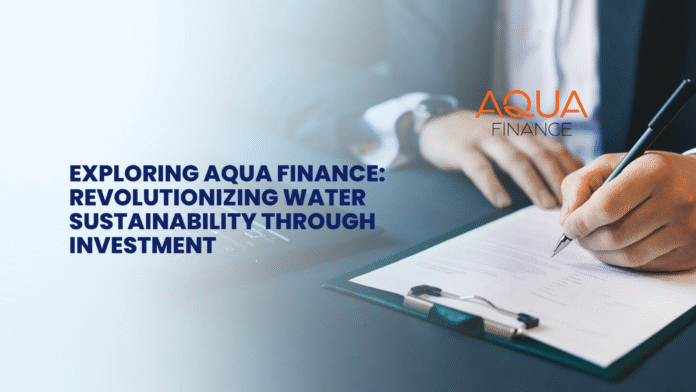In recent years, the world has been waking up to the stark reality of water scarcity, pollution, and climate change, all of which impact the planet’s most vital resource—water. To address these challenges, the concept of Aqua Finance has emerged, combining finance with water conservation and management to pave the way for more sustainable solutions.
Aqua finance, while still in its nascent stages, is rapidly growing and evolving. It plays a crucial role in funding water-related projects that ensure a cleaner, more sustainable water future. In this post, we will explore Aqua Finance, its potential, challenges, and the critical role it plays in reshaping the future of water management.
Defining Aqua Finance
Aqua finance refers to the investment strategies, funding mechanisms, and financing solutions designed to support water-related projects and sustainability. These include efforts focused on water resource conservation, pollution reduction, and infrastructure development. Aqua finance is often seen as an extension of broader green and blue finance, which seeks to address environmental challenges through innovative financial approaches.
This branch of finance covers a wide range of activities such as:
- Funding infrastructure for clean drinking water and sanitation.
- Investing in water treatment technologies.
- Supporting the development of sustainable irrigation practices in agriculture.
- Financing water-efficient technologies like desalination or wastewater recycling systems.
- Backing solutions for water pollution control and stormwater management.
In essence, Aqua Finance is about harnessing capital to improve the availability, quality, and management of water resources.
Why Aqua Finance Matters
The importance of Aqua Finance has skyrocketed in recent years, as global water challenges grow increasingly severe. The United Nations reports that nearly 2 billion people around the world face severe water stress, while 80% of wastewater goes untreated, polluting water systems across the globe. Water scarcity is expected to impact two-thirds of the global population by 2025.
With climate change exacerbating these issues, Aqua Finance has never been more critical. It serves as a mechanism through which governments, organizations, and individuals can fund water-related projects that address the growing demand for clean water, mitigate water scarcity, and improve the management of existing water resources.
Moreover, Aqua Finance aligns with the increasing demand for investments that not only generate financial returns but also promote positive social and environmental outcomes. This has given rise to a greater focus on socially responsible investing (SRI) and environmental, social, and governance (ESG) criteria in water-related investments.
Key Areas of Aqua Finance Investment
- Modernizing Water Infrastructure
Many regions, especially in developing countries, suffer from outdated water systems that fail to meet modern needs. Aqua Finance funds the construction of new water treatment plants, sewerage systems, and water distribution networks. This investment ensures that communities have reliable access to clean and safe water, which is essential for public health and economic development. - Water-Saving Technologies
Technologies that reduce water waste are fundamental to solving the water crisis. Aqua Finance supports innovations such as advanced irrigation systems that minimize water loss or wastewater treatment and recycling systems. These technologies can significantly reduce the pressure on water resources while offering long-term environmental and economic benefits. - Sustainable Agriculture
Agriculture is the largest user of water globally, making sustainable farming practices crucial to water conservation. Aqua Finance facilitates the funding of water-efficient irrigation systems, rainwater harvesting techniques, and other innovations designed to reduce agricultural water usage while boosting crop yields and farmer livelihoods. - Mitigating Water Pollution
Polluted water has devastating impacts on human health and ecosystems. Aqua Finance can direct capital into projects aimed at treating industrial wastewater, cleaning up contaminated water bodies, and investing in technologies that prevent further water contamination. This reduces the long-term environmental impact of industrial and urban growth. - Community Water Initiatives
Aqua Finance is also instrumental in funding water projects in underserved and rural areas. Whether it’s building wells or setting up sanitation systems, this type of financing improves public health and quality of life in communities that lack basic access to clean water and sanitation.
The Role of Green Bonds in Aqua Finance
Green bonds have emerged as a popular mechanism to fund sustainable projects, including those focused on water. These bonds are a form of debt issued to raise capital for environmental projects, and Aqua Finance is tapping into this avenue to finance water infrastructure projects, water conservation technologies, and pollution control initiatives.
Investors in green bonds receive a return on their investment, while also contributing to projects that have measurable positive impacts on water management and conservation. Aqua Finance-backed green bonds offer a powerful tool for large-scale water projects that need significant upfront capital.
Overcoming Challenges in Aqua Finance
Despite its potential, Aqua Finance faces several challenges that could hinder its growth:
- High Initial Capital Costs
Large water projects often require substantial upfront investments, which can deter potential investors. The long payback periods of many water-related initiatives also add perceived risk. Aqua Finance must find ways to lower these risks, perhaps through innovative financial products, subsidies, or partnerships between public and private sectors. - Lack of Clear Metrics
Measuring the success and impact of water-related investments remains difficult. Investors and stakeholders need standardized metrics and clear guidelines to assess both the environmental and financial outcomes of their investments. The development of these standards is crucial to the future of Aqua Finance. - Regulatory Hurdles
The regulatory landscape surrounding water projects is complex and varies significantly from region to region. Investors must navigate a labyrinth of local laws, policies, and restrictions, which can introduce delays and uncertainties. Simplifying and harmonizing these regulations would make Aqua Finance more attractive to investors. - Unequal Water Access
Water issues differ significantly depending on the geographical location. While some areas face acute water scarcity, others deal with overabundant and polluted water. Aqua Finance must adapt its solutions to the unique challenges of different regions, which complicates the development of universal investment strategies.
The Future of Aqua Finance
The future of Comapany looks promising, especially as the global community becomes more aware of the urgency of addressing water-related challenges. By focusing on sustainable water solutions, can help manage the ever-growing demand for clean water and mitigate the negative effects of pollution and climate change on water systems.
As water scarcity and pollution continue to impact billions of people worldwide, Aqua Finance offers a way to channel investment into initiatives that safeguard one of the world’s most essential resources. Innovations in water conservation, such as efficient irrigation and water desalination technologies, alongside the growing interest in green bonds, will continue to propel Aqua Finance forward.
For investors and companies, Aqua Finance provides an opportunity not just to generate a return, but to contribute to a solution that addresses one of the greatest challenges of our time. As governments, NGOs, and the private sector collaborate, Aqua Finance will play an increasingly important role in shaping a sustainable future for water management.
Sources:
- United Nations Water (https://www.unwater.org/)
- World Bank – Water and Sanitation (https://www.worldbank.org/en/topic/watersupply)
- Green Bond Principles (https://www.icmagroup.org/green-social-and-sustainability-bonds/)
- Water.org (https://water.org/)
- The Global Water Crisis (https://www.theglobalwatercrisis.com/)
With its unique intersection of finance and environmental responsibility, Aqua Finance holds significant promise. By investing in water sustainability, we ensure that future generations will continue to have access to clean, safe water, while also generating profitable returns for investors. It’s a win-win for both the planet and the financial world.




